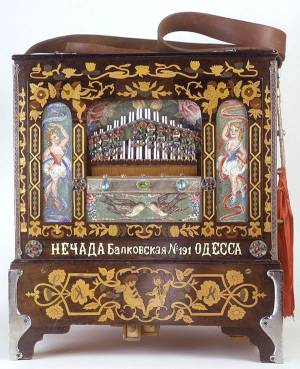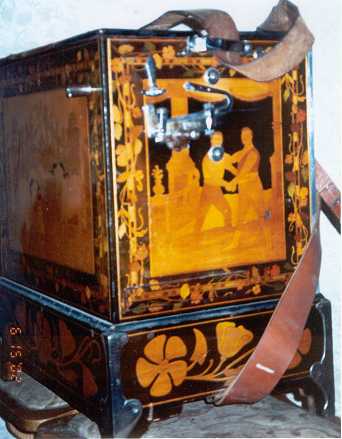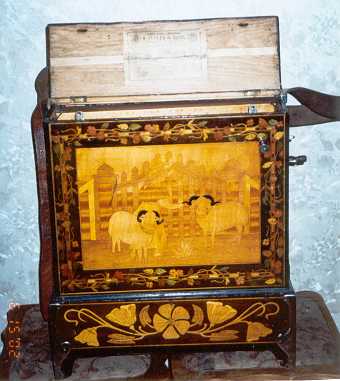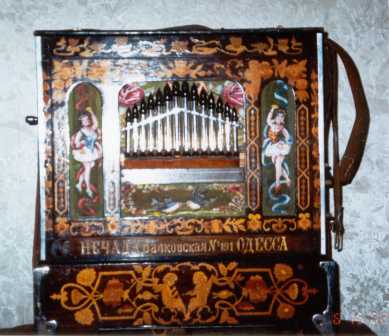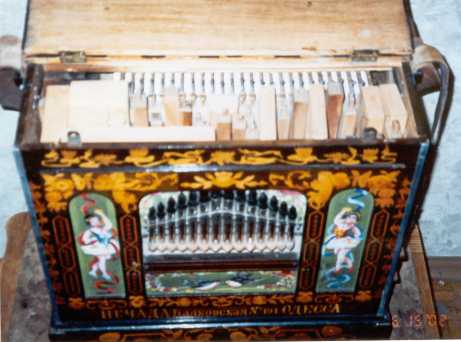| You Are Not Logged In | Login/Get New Account |
|
Please Log In. Accounts are free!
Logged In users are granted additional features including a more current version of the Archives and a simplified process for submitting articles. |
|
MMD
 Gallery
Gallery
 Pictures
Pictures
 nechada
nechada
|
|
by Robbie Rhodes (020621 MMDigest) by Nic Iljine (021111 MMDigest)
For Sale: 26-key barrel organ by Nechada of Odessa, circa 1910. Photographs show that the case is decorated with paintings and marquetry (inlaid wood). On the front are two painted dancing girls and marquetry designs of flowers and cherubs. The maker's name and address (in Cyrillic) are carved into the front: NECHADA
On the rear is a large marquetry design of two rams in a pen. On the side opposite the crank is another large marquetry design that appears to be two wrestlers who are standing before the wrestling begins. The seller provides this data: Made in 1910, by master Nechada, in Odessa.
[ 14 pipes are exposed on the front of the organ.
On the roof inside there is a list of songs, the Russian
The organ is located in Moscow.
The seller's name is Igor, his firm is "Zao Alastor"; he may be contacted at his business email: Zao Alastor <vladimir@ztel.ru> Robbie Rhodes
High-resolution images:
Barrel Organ by Nechada of
Odessa
Nic Iljine wrote to me asking for information about organs by Nechada of Odessa and so I told him of the article in 020621 MMDigest. Then on 3 Nov 2002 he wrote to me: "Hi, Robbie, Thanks for the prompt reply. I am currently in Moscow and I just bought such a barrel organ from an antique shop. They were widely in use in Tbilissi (Georgia) where even the name of the player was engraved on the front, etc. I am in the process of editing a book on old Odessa (due out next year at Washington University Press, Seattle) and that will be a joyful additional illustration. Cheers, Nic" Hi, Robbie, This text and illustration will be published in "Odessa Memories", University of Washington Press, 2003. I thought it might be of interest to your MMD readers. With best regards, Nic Iljine
- - - Barrel Organs from Odessa (Russia)
Odessa pianos and "musical machines" were distributed throughout Russia. One popular instrument was the sharmanka. The name comes from the first line of a very popular song, "Charmante Katharine." The Ukrainian name for the instrument, Katerinka, comes from the song, too. The sharmanka was a portable organ without keyboard, used by wandering musicians. The Odessa factories gradually learned to put several dozen popular melodies into the music box: folk songs, waltzes, and opera hits. The organ grinders usually set up near bars or "houses of ill repute" and were subjected to moralizing lectures for exploiting pretty girls of eight to ten, making them dance, tumble, and do various tricks with hoops to amuse the drunken audiences. Activists from the Society for the Protection of Animals persecuted the organ grinders for dragging around the monkeys and other exotic animals with them. By the 1860s the sharmankas and "musical machines" of Morits Raush were available in Moscow and St. Petersburg, Nizhny Novgorod, and Warsaw and were especially popular in Tiflis, and in the 1880s another Odessite had become a major figure in that market -- Kondrad Hek. And even in the early twentieth century, when wind organs were being replaced by more modern methods of mechanical reproduction of musical instruments (foremost by the gramophone), the Odessa sharmankas continued to sell well both in the empire and abroad. They were manufactured at the factory of Ivan Viktorovich Nechada, located on Balkovskaya Street, 191, where it borders on Vinogradnaya (today, Isaac Babel Street). Nechada's high-quality and beautifully ornamented sharmankas were used by street musicians for many decades, right up until the 1960s. Oleg Gubar, Odessa, November 03, 2002 High resolution image:
21 June 2002, 13 November 2002 |
|
|
|
|
|
|
|
|
|
CONTACT FORM: Click HERE to write to the editor, or to post a message about Mechanical Musical Instruments to the MMD Unless otherwise noted, all opinions are those of the individual authors and may not represent those of the editors. Compilation copyright 1995-2026 by Jody Kravitz. Please read our Republication Policy before copying information from or creating links to this web site. Click HERE to contact the webmaster regarding problems with the website. |
|
|
||||||
|
